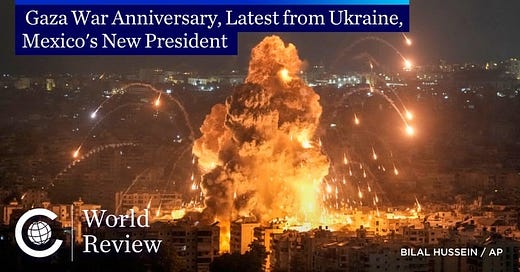World Review: Gaza War Anniversary, Update on Ukraine, Mexico's New President
A brief synopsis of this week's show
Each Friday morning, I host a video podcast called “World Review with Ivo Daalder” where three journalists from major news outlets around the world join me in discussing the latest global news stories of the week.
This morning, October 11, I was joined by Catherine Philp of The Times, David Luhnow of the Wall Street Journal, and Matt Kaminski of Politico
“World Review is always fascinating. I love the fact that you can get journalists from around the world to participate since zoom is the medium.”
— A Subscriber to America Abroad
While I encourage you to watch or listen to the episode (and subscribe wherever you get your podcasts!), here are a few interesting things I took away from our discussion:
Looking back a year to when Hamas attacked Israel and massacred 1,200 people, and kidnapped some 250 more, much has changed — in Israel, in Gaza, in the Middle East, around the world. Matt suggested that for Israelis October 7 was their 9/11 — a transforming event that changed everything, most importantly an unwillingness to live with direct threats to their security. The result was an unrelenting war, first against Hamas in Gaza and now against Hezbollah in Lebanon. And while Israeli society remains deeply divided, not least over the question of who bears responsibility for October 7 and how to prioritize the hostages in the war, support for the destruction of Hamas and Hezbollah is widespread. And one year later, even Prime Minister Benjamin Netanyahu, the only person in power never to have taken any responsibility for what happened that October day, has recovered his standing politically. Yet, just as 9/11 was followed by big mistakes on the part of the United States, not least the misplaced confidence that overwhelming military power can solve security problems on their own, so in Israel there is a growing sense that despite all the destruction of opposing forces, whether Israel is more secure today than before the war is still very much an open question.
Ukraine, meanwhile, continues to suffer from a bloody, protected war of much greater scale than in the Middle East. Russia is steadily gaining territory in the East but at a staggering cost. According to US and British intelligence, Russian losses in the month of September — at over 1,200 dead and wounded per day — were higher than in any previous month since the full-scale invasion of Ukraine. Some 615,000 men — more than the entire population of Wyoming — have been killed and wounded in the past 30 months. And, yet, as Catherine explained, there is no end in sight to the war. Russia continues to pounce along the frontline and attacking cities and civilian infrastructure. Ukraine is resisting and demonstrating an ability to hurt Russia inside its own country — occupying a larger swath of territory in the Kursk region than Russia has been able to concur since its latest offensive started nearly a year ago. And Ukrainian deep strikes are working — in one case destroying two-three months of ammunition stocks, according to Estonian intelligence. Yet, as Matt noted, Ukrainians remain frustrated with the lack of western support, not least the continued refusal of the Biden administration to endorse central parts of its “victory plan,” and fearful at the same time that the November elections will bring to power a US president who will end support altogether.
We did not have enough time to do full justice to the important developments in Mexico, where a new president took office at the beginning of the month. Claudia Sheinbaum is the first female and first jewish president in Mexico — but her fealty to her mentor and predecessor, Andrés Manuel López Obrador, David maintained, likely render these firsts political irrelevant. Sheinbaum faces an economic crisis, growing violence among warring cartels, and a predecessor likely to hold the reigns of power behind the scene. Mexico has a huge opportunity for a reset in the next six years — especially if Kamala Harris were to join her as the first woman president of the Unite States. They could try new approaches to security cooperation, strengthening Mexico’s economy to offer a real North American alternative to Chinese manufacturing, and address the issues of migration and temporary workers cooperatively. The question is whether either will seize the opportunity.
That’s it for my quick takes of this week’s episode here on America Abroad. To get the full flavor, please listen to the episode itself.





